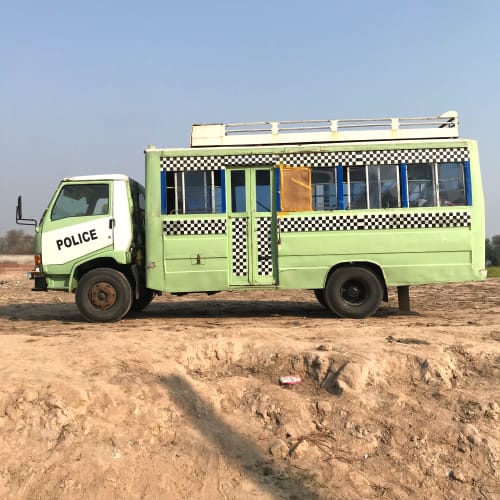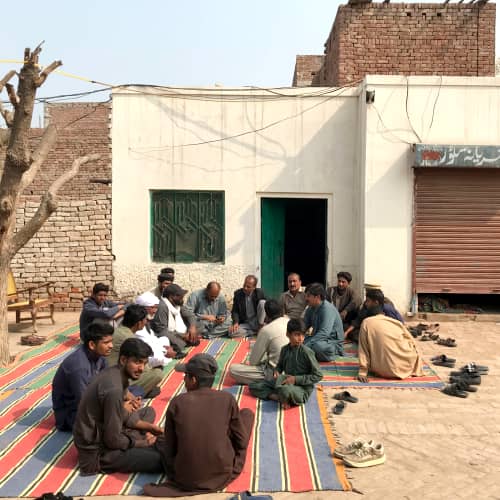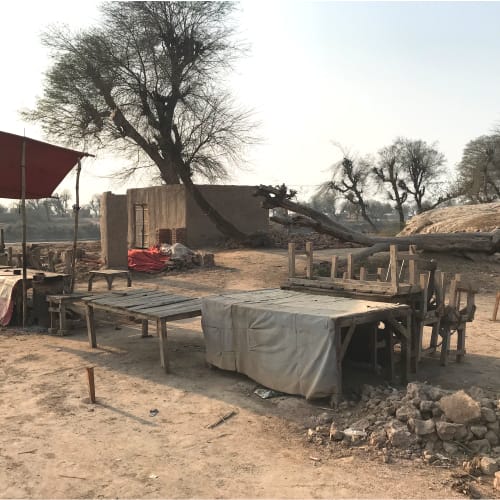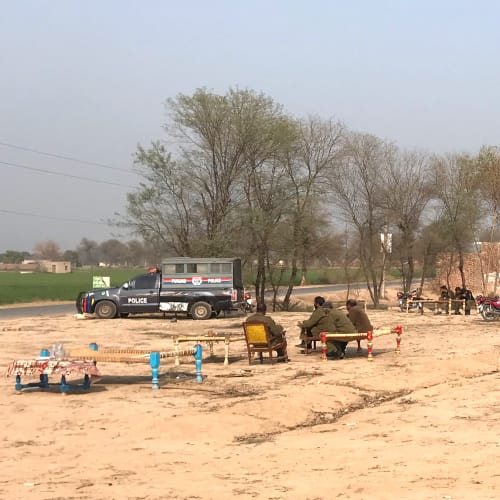Ramzan Shahid, an elderly landowner, was visiting a police station on February 12th, 2022 at around 5:30 pm for some personal reason. While he was there, he got a call from his son who informed him about some commotion at Shah Muqeem Mosque that he has built on his own land. He left the police station and reached the mosque within a few minutes.
A man named Rana Muhammad Mushtaq was locked there in a room and three policemen were trying to protect him from an angry mob of several hundred people. He was accused of burning some sacred papers
The mosque is located in a village called Dangrawala, which is a part of Mian Channu tehsil of Khanewal district in southern Punjab. Talamba, the birthplace of a famous religious preacher, Tariq Jameel, is about five kilometres away from this village. In a video statement posted on the Internet, Shahid can be heard saying that "the police wanted to evacuate Mushtaq from the mosque to a safe place but the number of people in the mob was constantly increasing so it was not possible for only three or four police officials to handle them.”
Soon, some people stormed the room where Mushtaq was locked up, he says. When police officials tried to stop them, the mob beat them up and drove them away from the room, he adds. Then they broke its lock and dragged Mushtaq out while beating him with sticks, pebbles, bricks and axes. He died shortly afterwards.
 The room where Mushtaq was detained
The room where Mushtaq was detained His body was later hung upside down from a tree outside the mosque.
His corpse was still hanging when some journalists from Talamba reached Dangrawala at around 9:15 pm. A large number of government officials, including District Police Officer Khanewal and Assistant Commissioner Mian Channu, were also present there. They then took down Mushtaq’s body from the tree at about 9:30 pm and also arrested some of the people carrying sticks in the vicinity of the mosque.
The blood trail
Three days after Mushtaq's death, at around 4 pm, Shah Muqeem Mosque is completely empty because the district administration has stopped people from entering it. Bloodspots can still be seen in the room where Mushtaq was locked up as well as in the courtyard, indicating the path he was dragged on while he was taken out of the room. There are also some blood stains on the tree on which his body was hung. For some unknown reason, the police have peeled the bark from a part of the trunk where the stains were darker.
About 20 policemen are sitting outside the mosque on charpoys. Most of them have been called from Faisalabad district and they have been on duty since 8 am without being given anything to eat or drink.

The police officials were present during the mob attack but were unable to control them
Talamba’s local police, in the meanwhile, is investigating Mushraq’s murder. The biggest obstacle it is facing in this task is its own preliminary information report (FIR) because that has many loopholes.
It, for instance, states that Mushtaq died at 9:20 pm although, according to a doctor who performed an autopsy on his body, the actual time of his death was between six and seven pm. The FIR also mentions that some police officers were present at the scene of the crime before the lynching began. This raises the question as to why they did not call for a backup in time despite being aware of the apparent danger of violence.
Some local police officials, speaking on the condition of anonymity, say that even the presence of a large number of policemen might not have prevented the mob from killing Mushtaq. This is because the police do not want to take any drastic steps to disperse the mob in such circumstances, one of them says. They are reluctant to do so because they have to face departmental inquiries and court proceedings if someone in the mob gets killed in their action. He also says the police do not have the motivation, the administrative capacity and the powers that are necessary to deal with incidents of mob violence such as the lynching of Mushtaq.
Ghost town
At a distance of about one kilometre from Shah Muqeem Mosque, the village of Jangal Dairewala is located on the bank of a large canal. Most of the people involved in Mushtaq’s killing belong to this village.
Also read this

Mob lynching in Talamba: Killing a schizophrenic in the name of religion
It is eerily quiet on the evening of February 15th, 2022. Its streets are deserted and its shops are all shut. No one is present even in the local mosque. Some women who step out of their houses, immediately go back in when they see strangers in the streets.
An elderly woman living in a house adjacent to a closed shop says in a brief conversation that police arrested dozens of men from Jangal Dairewala shortly after Mushtaq's death. "Those who went to the police station to have the arrested persons released were also arrested. Since then, almost all the men in the village have either been detained by the police or they have gone into hiding to avoid arrest,” she says. They are being kept at an unknown location instead of being detained at a nearby police station, she adds.
A statement issued by the Punjab police via Twitter on February 13th, 2022, however, does not confirm such a large number of arrests. It, instead, states said that 15 main accused involved in the murder have been identified while "CCTV footage is being used for identifying the rest". (What is surprising about this statement is that there are no CCTV cameras installed at or around the murder scene.)
 A desolate sight of Jangal Dairewala after the multiple arrests made by the police
A desolate sight of Jangal Dairewala after the multiple arrests made by the policeCommenting on the situation, Lahore High Court lawyer Asad Jamal (who has been a counsel in several blasphemy cases) says the police keep detainees in unknown places because they do not want their arrests to be on official record. “The police pressurise the arrested people during their detention to get statements that will help them cover up the flaws in their own investigation."
He also says that, instead of arresting as many people as it can, "the police should focus on identifying and apprehending the real culprits". The large number of arrests cause legal complications during the trial, “making it difficult for the police to defend its own case," he says. In most cases of mob killings, the courts do not convict the accused because the police fail to identify the people responsible for inflicting the deadly blows.
This same situation was witnessed during a recent court hearing in the case of two brothers, Mughees Butt and Muneeb Butt, both residents of Sialkot, who were killed by an angry mob in 2010. Initially, a court had sentenced seven people to death in connection with their murder but, after hearing their appeals, the Supreme Court commuted their sentences to 10 years in prison on October 23rd, 2019.
Published on 12 Mar 2022



















